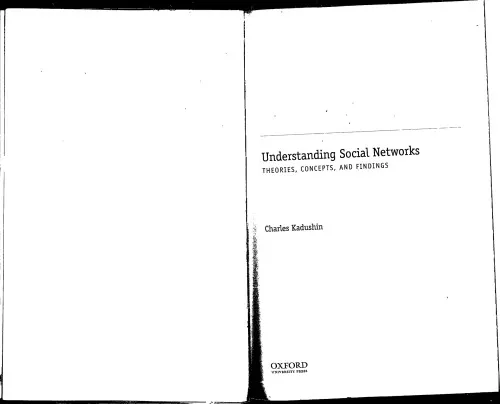Interpersonal Networks in Organizations: Cognition, Personality, Dynamics, and Culture (Structural Analysis in the Social Sciences)
4.5
Reviews from our users

You Can Ask your questions from this book's AI after Login
Each download or ask from book AI costs 2 points. To earn more free points, please visit the Points Guide Page and complete some valuable actions.Related Refrences:
Introduction to "Interpersonal Networks in Organizations: Cognition, Personality, Dynamics, and Culture"
"Interpersonal Networks in Organizations: Cognition, Personality, Dynamics, and Culture" is a groundbreaking exploration of the interplay between human relationships and organizational structures. Written by Martin Kilduff and David Krackhardt, this book provides an unparalleled synthesis of the cognitive, personality-driven, dynamic, and cultural dimensions that shape interpersonal networks within organizations. By bridging rigorous social science research with practical implications, the book serves as both a roadmap for academics and a guide for managers seeking to optimize their organizational effectiveness.
At the heart of this work lies the premise that social networks are not static structures but are created and reshaped by the behaviors and beliefs of individuals. Whether you are a scholar or a professional, the book invites you into a deeper understanding of how human relationships govern decision-making, innovation, resource sharing, and overall organizational success. This text does not just describe social networks; it explains why they matter and how they evolve over time.
Detailed Summary of the Book
The book is divided into several thematic areas that span cognition, personality, dynamics, and culture within organizational networks. Each section dives into key concepts supported by empirical research, real-world examples, and theoretical perspectives. The authors integrate findings from psychology, sociology, and management sciences to create a multidimensional framework to analyze organizational networks.
The first section examines the cognitive underpinnings of networks, exploring how people perceive, interpret, and respond to their own network positions and those of others. This perspective reveals how cognitive biases, mental maps, and social perceptions influence network behaviors. The book then transitions to personality, investigating how individual traits such as extraversion, openness to experience, and need for affiliation shape the networks people form and maintain.
In its exploration of network dynamics, the authors emphasize the fluid and evolving nature of social connections. Organizational life is marked by changes in leadership, goals, and external pressures, all of which have profound effects on network structures. The authors highlight how actors navigate these shifts and adapt to maintain social coherence and resource access.
The final major theme, culture, examines how shared values and norms within organizations foster or constrain specific patterns of network interaction. By linking culture to networks, the book provides insights into how organizations can leverage their unique cultural contexts to build stronger, more effective relational systems.
Key Takeaways
- Social networks in organizations are dynamic and continuously evolving, influenced by individual and collective behaviors.
- Cognitive perceptions of network structures often differ from objective realities, leading to biases in decision-making and collaboration.
- Personality traits significantly influence how people form and maintain professional networks, with clear implications for leadership and teamwork.
- Organizational culture plays a crucial role in defining the form and functionality of social networks, shaping connectivity and innovation.
- Understanding network structures can improve organizational strategies for resource allocation, conflict resolution, and knowledge sharing.
Famous Quotes from the Book
"Networks are like fingerprints—no two are the same, and each reveals the unique history, behaviors, and priorities of the individual."
"Cognition is the lens through which people view their networks, distorting some relationships while overlooking others."
"Organizations succeed when they learn to harness not just formal hierarchies but the informal networks that drive creativity and resilience."
Why This Book Matters
"Interpersonal Networks in Organizations" stands as a critical contribution to the study of social networks and their influence in organizational settings. The book is invaluable to anyone interested in understanding the human connections that power organizational success, from executives and team leaders to HR professionals and consultants.
The relevance of this work lies in its multi-faceted perspective, which bridges theory and practice. By focusing on cognition, personality, dynamics, and culture, the book provides a comprehensive framework for analyzing interpersonal networks in all their complexity. In an era where collaboration, knowledge sharing, and adaptability are paramount, understanding the networks within organizations gives scholars and practitioners a competitive edge.
Moreover, the book’s insights have applications far beyond the workplace. Its lessons on human behavior, perception, and interaction ripple outward to inform broader societal and communal relationships. In sum, Kilduff and Krackhardt have not only written a book about organizational life but have also contributed to our larger understanding of how human beings connect and thrive together.
Free Direct Download
You Can Download this book after Login
Accessing books through legal platforms and public libraries not only supports the rights of authors and publishers but also contributes to the sustainability of reading culture. Before downloading, please take a moment to consider these options.
Find this book on other platforms:
WorldCat helps you find books in libraries worldwide.
See ratings, reviews, and discussions on Goodreads.
Find and buy rare or used books on AbeBooks.
1411
بازدید4.5
امتیاز0
نظر98%
رضایتReviews:
4.5
Based on 0 users review
Questions & Answers
Ask questions about this book or help others by answering
No questions yet. Be the first to ask!























